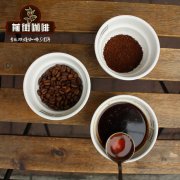Can farmers sell whole coffee berries instead of beans? Is that better?

It is generally believed that small farmers need to cooperate and collect harvested fruits, processing and direct trade in order to be competitive and profitable in the coffee industry.
As long as small farmers are not linked to certified cooperatives, cup testing laboratories, processing plants and import and export units, they will never be able to get rid of the cycle of poverty caused by intermediary exploitation. This view may be basically true, but there are exceptions.
For the past few years, CRS has been implementing a program in the low (600m) to middle (1100 m) elevations of the San Marcos coffee producing area in Guatemala. The project was originally designed to study ways to fight coffee leaf rust, focusing on supporting unorganized coffee farmers to start reforming their farms. It also organizes community members into small banks (a group of 15-20 members) and intra-community loans (SILC). The group then mobilized to form a larger network (10-20 groups). Over the years, the program has evolved and solved new problems, as farmers and CRS have evolved their understanding of the supply chain.
Compared with other parts of Guatemala, the Nuevo Progreso area of San Marcos has a lower yield (1400 pounds per hectare). Some people have discussed why this may be caused by nutrients in the soil that are not suitable for growing coffee or excessive rainfall (3000 to 4000 mm per year). Most of the coffee in the area is produced by disorganized small farmers who sell coffee in the form of whole fruit at the gate of the farm.
The financial data collected by the author can be predicted that the cost is higher than the income and the income cannot make ends meet, which is related to the low coffee season price, the relatively low farm price and the low profit rate. After talking to several buyers operating nearby and using our coffee quality standards to measure coffee scores in the area (with an average cup test score of 81.5), we speculated that high-end boutique coffee is unlikely to be a solution for these farmers.
Los Volcanes is a social mission exporter in Guatemala responsible for the production and export of quality coffee and prides itself on the traceability of its supply chain. During the 2018-2019 harvest, Los Volcanes worked with CRS and its farmers to operate an alternative business model that might be feasible in the region. This model takes advantage of the strengths of the three cooperative roles and mitigates some of the weaknesses listed above.
This model includes:
1. The small farmers' group organized from CRS mobilizes the harvest once a week.
two。 According to the exporter's instructions, the ripe coffee fruit is harvested at the right time, and then the SILC team carries out the second stage of the quality control process.
3. The logistics system composed of SILC ensures that all harvested fruits are transported to the processing plant, and the logistics funds are provided by the network commercialization fund.
4. The coffee is shipped to Antigua for a 12-hour processing process, and farmers are paid within 48 hours of the operation of the SILC network, deduct logistics costs to supplement the network's commercialization fund, and distribute the balance to farmers. The network, composed of representatives of each participating SILC, is responsible for managing the commercialization fund and ensuring accountability and transparency in accordance with the financial and accounting standards of the methodology.
This model has many benefits. Due to good fruit picking and organizational skills, farmers are protected by 40% higher than the average farm price (after deducting costs). Farmers are paid in a transparent and direct manner within 48 hours, and cash is deposited directly into the commercialization fund of the SILC network. Unorganized farmers are exempt from extra post-harvest processing work and do not need to do so.
Finally, taking into account the accuracy and attention required for fruit picking and grading, farmers have to pay the number of workers and wages in this part, which is 20% higher than the average daily wage in the area, thus benefiting the third group.
In turn, according to its precise quality control standards, Los Volcanos has been able to improve the quality of Nuevo Progreso coffee above its benchmark score. It can also recognize other buyers of SILC online coffee.
The next year, Los Volcanes needs more production, and SILC Networks is asking why they haven't used this model for commercialization for years. As the purchase price of coffee continues to hit bottom, participants in the country of origin and downstream of the supply chain must continue to examine how the model works and innovate to improve profitability.
Important Notice :
前街咖啡 FrontStreet Coffee has moved to new addredd:
FrontStreet Coffee Address: 315,Donghua East Road,GuangZhou
Tel:020 38364473
- Prev

What physical changes occur when coffee is roasted? What are the changes in the sodium metanide reaction and caramelization?
Roasting converts coffee beans from green to ripe, rich in aroma and flavor, but do you know what happens during roasting? When we roast beans, it is mainly divided into physical and chemical changes. This article is the first of two series. Let's first take a look at what happens to coffee beans during roasting. The importance of physical structure The layered structure of coffee beans for roasting out what we want
- Next

How to store coffee beans and extend their shelf life? How long will the coffee beans last?
Bean bakers will carefully observe the characteristics of raw beans, through cup tests to ensure the quality of the sample, and then can find out the best way to roast the beans, and try many ways to find out how to lead to the best flavor of this coffee. But what if you make so much effort, but the quality of the coffee is damaged because of the poor storage system of the roasted coffee? Or you can't bake it as quickly as you expect.
Related
- Beginners will see the "Coffee pull flower" guide!
- What is the difference between ice blog purified milk and ordinary milk coffee?
- Why is the Philippines the largest producer of crops in Liberia?
- For coffee extraction, should the fine powder be retained?
- How does extracted espresso fill pressed powder? How much strength does it take to press the powder?
- How to make jasmine cold extract coffee? Is the jasmine + latte good?
- Will this little toy really make the coffee taste better? How does Lily Drip affect coffee extraction?
- Will the action of slapping the filter cup also affect coffee extraction?
- What's the difference between powder-to-water ratio and powder-to-liquid ratio?
- What is the Ethiopian local species? What does it have to do with Heirloom native species?

